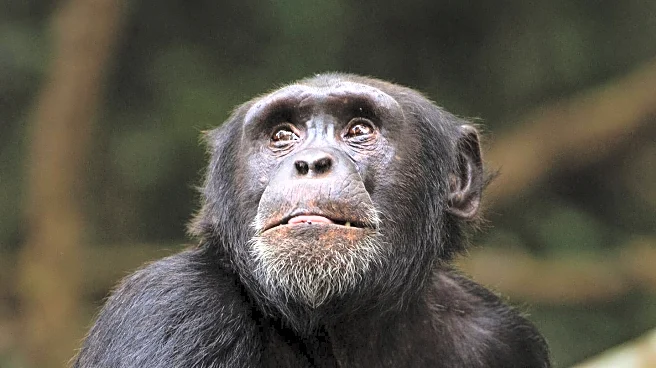What's Happening?
A recent study conducted by scientists from the University of California Berkeley and other institutions has found that wild chimpanzees in Uganda and Côte d'Ivoire consume fruit with an alcohol content equivalent to nearly two cocktails for humans. The research involved testing figs in Uganda's canopy and plum-like fruits on the forest floor in Côte d'Ivoire, revealing an average alcohol content of about 0.3% by weight. This level is comparable to kombucha, but given that chimpanzees eat approximately 10 pounds of fruit daily and weigh around 90 pounds, their intake amounts to about 14 grams of ethanol. The study provides the first direct chemical measurements of ethanol in the fruits that wild chimps routinely eat, connecting these numbers to their daily intake.
Why It's Important?
The findings of this study are significant as they offer insights into the dietary habits of chimpanzees and their potential attraction to alcohol, which may be rooted in ancestral fruit-eating behaviors. This research supports the 'drunken monkey' hypothesis, suggesting that primates, including humans, may have an inherent attraction to alcohol due to their historical consumption of ripe fruit. Understanding these behaviors can shed light on the evolutionary aspects of alcohol consumption and its effects on feeding rates and dietary preferences. Additionally, the study highlights the natural fermentation processes in tropical fruits, which could have broader implications for understanding animal diets and behaviors in the wild.
What's Next?
Further research may explore whether chimpanzees actively select fruit for its alcohol content or if they are primarily driven by sugar and calorie intake. This could lead to a deeper understanding of the dietary choices of primates and their evolutionary implications. Researchers might also investigate the effects of low-dose alcohol exposure on chimpanzee behavior and health, potentially offering insights into the broader impacts of alcohol consumption in wildlife. Additionally, the study's findings could prompt discussions on the conservation of natural habitats that support these dietary behaviors.
Beyond the Headlines
The study raises questions about the ethical considerations of human influence on wildlife diets, particularly in areas where fruit availability may be affected by human activities. It also touches on cultural dimensions, as the attraction to alcohol may be a shared trait among primates, influencing social behaviors and interactions. Long-term shifts in fruit availability due to climate change or deforestation could impact the dietary habits of chimpanzees and other wildlife, highlighting the importance of preserving natural ecosystems.









